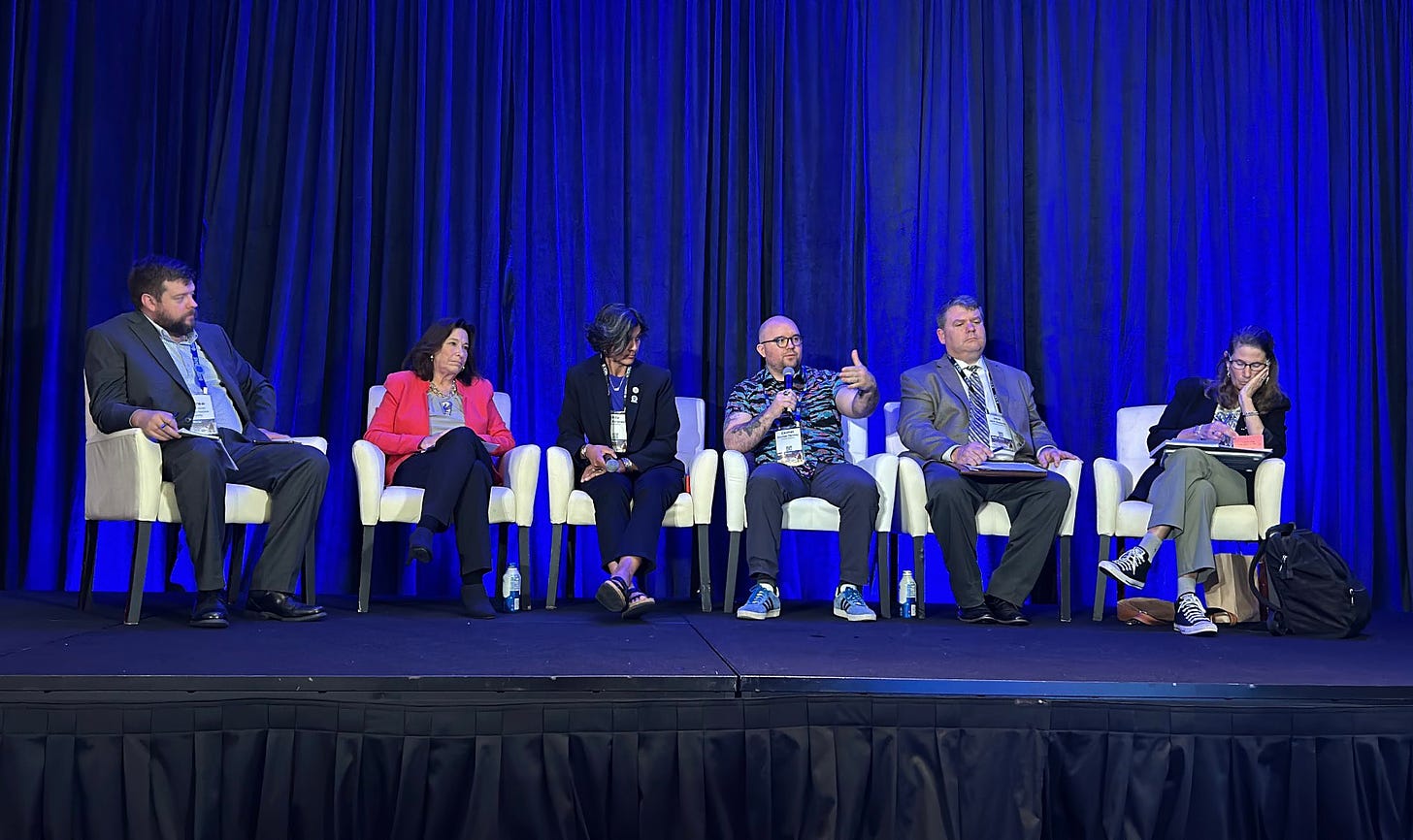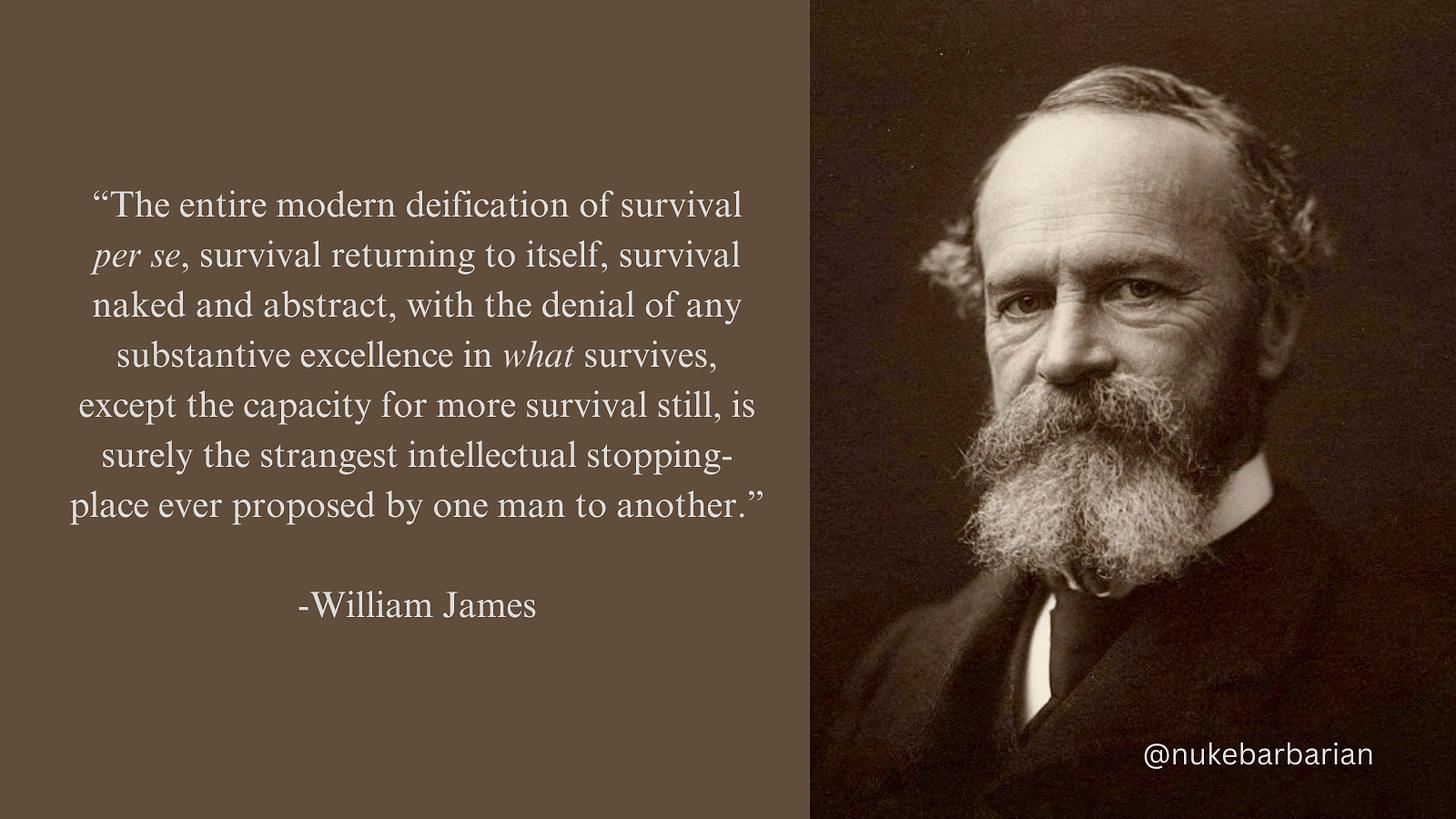
Last week I spoke on a panel about nuclear communications at ANS’s annual winter conference. The theme of the panel focused on how to communicate a bi-partisan message about nuclear and how to handle the hard part: maintaining some kind of comms discipline as we endeavor to build more nuclear. I think the panel was a smashing success of broad thinking and non-partisan collaboration.
In my remarks, I focused on what I call the case for prudence. Nuclear has officially won the comms battle against its opponents (thanks, Germany!), but in the process, I believe nuclear advocacy has over-indexed on two important talking points that, if taken in isolation, incentivize overpromising. Before I explain what those two talking points are, I want to touch on the dangers of overpromising.
Way back when, Admiral Lewis Strauss advertised nuclear as the technical route toward a utopia with power too cheap to meter, which made nuclear’s failures sting all the more as plants came in over time and over budget during the 1960s and 1970s. For the first decade and a half of nuclear’s existence, it was strictly an insider’s game. So when nuclear failed, it signaled a larger failure across the American status quo. The 1970s, when the wheels really fell off for the nuclear industry, were a time of widespread mistrust in institutions. When nuclear failed to deliver on the promises the industry offered the public, the already tetchy public felt betrayed.
As a result, anti-nuclear advocates appeared as intrepid truth-tellers, rather than the sophists that they were. Although nuclear is no longer a mysterious technology lorded over by seemingly unaccountable elites in the way it once was, the 2020s are proving to be at least as injurious to institutional legitimacy as the 70s were. Thus, if we overpromise, we risk shattering the good faith we’ve built, because building out the US nuclear fleet will be a difficult process riven with failure—especially in the burgeoning SMR sector, where many questions can only be answered by the hard school of experience. Consequently, we should be as prudent as we can as we move forward.
Let’s get back to what I see as the two main talking points for nuclear.
The first is the technical case for nuclear. We all know that nuclear provides firm baseload power with an over 90% capacity factor, little land use, and a power density orders of magnitude beyond its competitors. I have found, much to my chagrin, that many people simply do not care about this talking point. Or, if they do, they do not respond as zealously as I would like. Beyond anecdote, my personal experiences point to the national trend. The American electorate remains moderate, desiring an “all of the above” approach to climate change. Nuclear may be technically superior, but that does not seem to confer superior public esteem. Moreover, most people do not want to become part-time energy experts, or even hobbyists. They want low bills. They want to run their washer at night and to watch Netflix with their families.
The second, related argument is the climate case for nuclear. This one is surprisingly less successful than the former. And that’s because while it’s true that nuclear will play a vital role—has to play a vital role—in solving climate change, climate change does not rate high on most people’s list of problems. According to polling from
and over at , Americans do not buy that climate change is an apocalyptic threat, do not care about reaching “net zero,” and rank climate change toward the absolute bottom of issues that concern them. Of course, having worked dead end jobs all over the country, these polling results came as no surprise to me.So, a few years ago, I asked myself a simple question, “Could I make a case for nuclear with its two seemingly greatest assets de-emphasized?” I did this for two reasons: I wanted to talk to people with lower energy literacy; and I wanted to talk to people who, by and large, do not believe climate change is an existential threat. And I wanted to do this because there are more of those people overall.
But there were philosophical reasons, too. At a certain point, I realized that telling people they ought to do something because the world will end if they don’t only demobilizes them, miring them in mistrust and anxiety. Frightening people with doomspeak also trivializes the apocalypse, trivialization being the chief means of physiological defense against the unthinkable. “When the grim rhetoric of survivalism invades everyday life,” observed the historian and cultural critic Christopher Lasch, “it simultaneously intensifies and relieves the fear of disaster.”
More importantly, I realized that survival is not why we should build nuclear power plants. The great American thinker William James once wrote that “[t]he entire modern deification of survival per se, survival returning to itself, survival naked and abstract, with the denial of any substantive excellence in what survives, except the capacity for more survival still, is surely the strangest intellectual stopping-place ever proposed by one man to another.” Survival is not a sufficient reason to do anything meaningful, except perhaps in cases of self-defense. We do not minister to the sick out of a dumb, species-wide impulse towards survival, and we don’t have children for that reason either. We do such things because they are meaningful, because they demand sacrifice and pitch us towards the greatest version of ourselves. In other words, we do these things in pursuit of the Good, in pursuit of excellence, so that we are changed by our own efforts.
It has ever been thus. The very opening of Aristotle’s treatise on politics asserts that every political community “aims at the most authoritative good.” This, of course, brings us to the most essential and controversial question of defining what the good is. I don’t want to get bogged down in philosophizing over the capital “G” good, except to say that I wanted to talk about nuclear power in a way that gestures to a capacious sense of the good, where any American could see in it our nation’s happy destiny.
And so I contemplated grand societal achievements like Notre Dame in France. I began to think about what it took to accomplish that civilizational jewel. But more than that, I considered the generational succession of artisanal and architectural jobs Notre Dame’s construction provided. The time frame to achieve its excellence seemed to me an antidote to the crisis-laden presentism that dominates our lives.
And so it dawned on me that nuclear power plants are, in their own way, just like cathedrals. For most of Christendom, communities were built around their churches and cathedrals. Likewise, nuclear power plants become the economic hub around which their communities are built, bringing wealth and enriching civil society. We can also make this point in the negative: communities that lose their nuclear plants never recover.
And then there’s nuclear’s potentially immortal lifespan. A nuclear plant properly maintained can survive for at least a century and likely much longer. That means that someone who helps build a nuclear plant can rest assured that successive generations of their progeny can work there, providing cheap, clean electricity to their area.
And so, when I speak to people about nuclear power these days, I refer to our power plants as Industrial Cathedrals for this reason. It incorporates a broader span of issues that Americans care deeply about—good, dignified work, cheap power, and a highly capable and highly trustful society that can deliver these goods. This vision of nuclear also attempts to overcome the cynicism and pessimism that pollute our everyday lives. To build a nuclear power plant is to tell ourselves that we believe in our own excellence, that we believe in our own future.
I don’t ask that my way of thinking should become dominant or that anyone should appropriate this perspective when it does not—perhaps cannot—fit the audience. What I do ask is that we consider seriously that in communicating about nuclear, we do not overcommit to arguments irrelevant to most people, nor that, having overcommitted, we overpromise on nuclear’s ability to quickly solve the fashionable problems of today. To do so would inevitably injure the public trust, because what we want to do is hard and we will stumble along the way.
Rather, I believe we should meet people where they are at and offer them a truthful look at the wonders we have already built so that we may build more. If people can see themselves in nuclear, if they can understand it as part of a shared prosperity and a shared destiny, then it will be more durable in the face of setbacks.
Related Articles:
A Republic of Industrial Cathedrals. For an atomic America of the people, by the people, and for the people
The Gospel of the Industrial Cathedral. A nuclear power vision for the new pro-labor GOP
The Problem With Counting Bodies. Why should we even build nuclear?






Linking the effort to build out nuclear to the wave of cathedral building that swept Western Society, and the reasons given for it's success is sheer genius.
Great stuff as always. I love this “we do it because it is awesome and so are we” approach.
Big/small we need them all for electricity, heat, etc. and we can keep making them cheaper as we go.